Editor:
Brandon Sweet
University Communications
bulletin@uwaterloo.ca
To Be Honest, the time is right for a new student Orientation play

Single & Sexy, a staple at Orientation for more than 30 years, has exited the stage.
Single & Sexy was a high-energy, entertaining, powerful presentation of scenarios and attitudes first-year students may witness or experience. In its day it was radical, thought-provoking and even politically incorrect, to showcase the absurdity of unwanted attitudes and behaviours. Performed from 1988 to 2019, it was enjoyed by over 100,000 students, staff, and faculty, and many students viewed it as the “Highlight of Orientation Week."
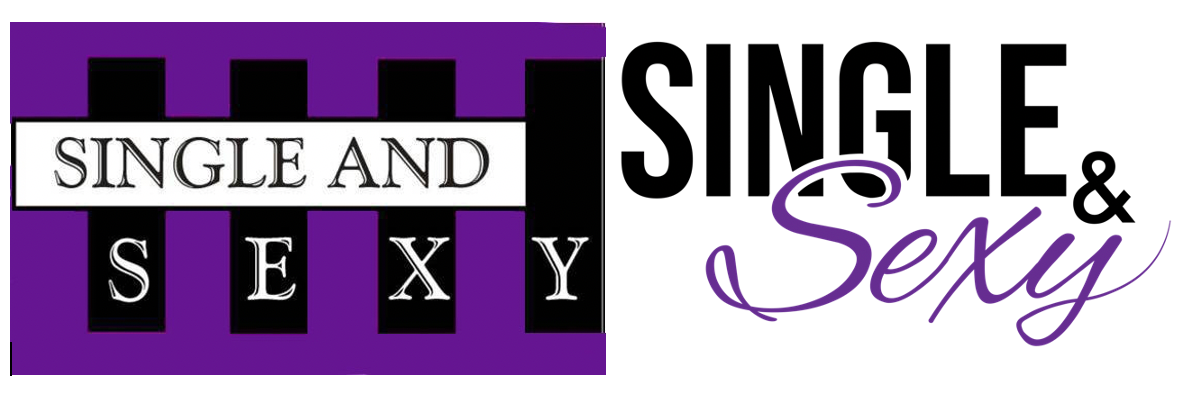
"While the play was appropriately ‘radical’ in its inception more than 30 years ago, the climate and culture of students has changed, especially in the last two years of the Covid pandemic," says a message from Campus Wellness, who has collaborated with students to write and revise the orientation play over the years. "The emotional journey and triggering content may be insensitive going forward."
A conceptual shift
"The typical student attending their first year of post-secondary studies in 2022 may have missed developmental milestones that prepare them academically and socially for university," writes Sandra Gibson, Manager of Health Education and Promotion in Campus Wellness. "Students may have experienced undue consequences from the pandemic including loneliness, isolation, anxiety, and/or depression, amongst others, and academically, the past two years has seen unprecedented variation with limitations on grading systems and intermittent quality learning in secondary schools."
"Consultation with our partners in WUSA and the Student Success Office (SSO), in addition to students, staff, and key campus stakeholders throughout May and June resulted in the development of a substantially revised script to showcase the play’s 2022 mission, vision and values, updated goals and expectations, and a new name," Gibson writes.
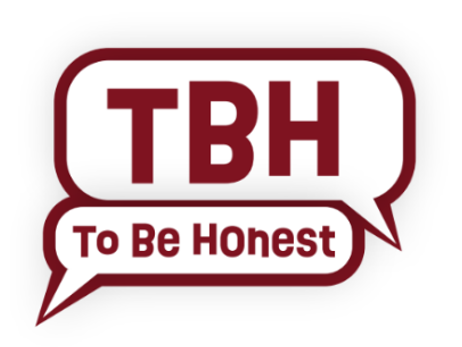
The newly-developed ‘TBH: To Be Honest’ new student orientation play will continue to follow students though a ‘year at a glance’ and includes issues such as homesickness, consent, academic integrity, imposter syndrome, and features many supports for students. However, in an effort to embrace students, ‘TBH: To Be Honest’ is more uplifting and welcoming, and has a strong theme to build connections and develop resiliency while attending university.
"We look forward to your attendance and feedback to the premiere performance of ‘TBH: To Be Honest’," Gibson writes. "We welcome University of Waterloo staff, faculty and students, family and friends, and community partners."
Thursday, September 1, 2022
3:00 p.m. to 4:00 p.m. (Doors open at 2:45 p.m.)
Physical Activities Complex (PAC) Gymnasium
The premiere performance is open to all; no registration or ticket required.
Using digital media to relax is related to lower-quality parenting, says study

Caregivers who consume digital media for relaxation are more likely to engage in negative parenting practices, according to a new multinational study.
The new study led by the University of Waterloo aimed to investigate the relationship between caregivers’ use of digital media, mental health, and parenting practices at the start of the COVID-19 pandemic. On average, caregivers spend three to four hours a day consuming digital media.
“All members of the family matter when we try to understand families in a society saturated with technology,” said Jasmine Zhang, lead author of the study and a master’s candidate in clinical psychology at Waterloo. “It’s not just children who are often on devices. Parents use digital media for many reasons, and these behaviours can impact their children.”
To conduct the study, the researchers surveyed 549 participants who are parents of at least two children between the ages of five and 18. Caregivers provided information about their digital use, their own mental health and their children’s, family functioning, and parenting practices.
The researchers found that caregivers with higher levels of distress engage in more screen-based activities and were more likely to turn to devices for relaxation. This consumption was correlated with negative parenting practices such as nagging and yelling. They also found that negative parenting behaviours were more likely when technology interrupted family interactions. The experiment didn’t focus on specific apps or websites that caregivers use but rather found that caregivers who spend time on screens were retreating from being present with their family, which is correlated with negative parenting practices.
However, not all media consumption was correlated with negative outcomes: maintaining social connections through digital channels was related to lower levels of anxiety and depression and higher levels of positive parenting practices such as listening to their children’s ideas and speaking of the good their children do.
“When we study how parents use digital media, we need to consider caregivers’ motivations for using devices in addition to how much time they spend on them,” Zhang said.
Dillon Browne, Canada Research Chair in Child and Family Clinical Psychology and professor of psychology at Waterloo, expects these patterns to continue after the pandemic.
“The family media landscape continues to grow and become more prominent,” said Browne, a co-author of the study. “Going forward, it’s important to consider the nuances of digital media as some behaviours are related to well-being, and others are related to distress.”
The researchers plan to build on these findings and hope that their work will aid in creating guidelines that will help caregivers manage their screen-based behaviours.
The paper, Caregivers’ psychological distress, technology use, and parenting: The importance of a multidimensional perspective, appears in the journal Computers in Human Behaviour.
Library announces new collection: Andrew Telegdi fonds
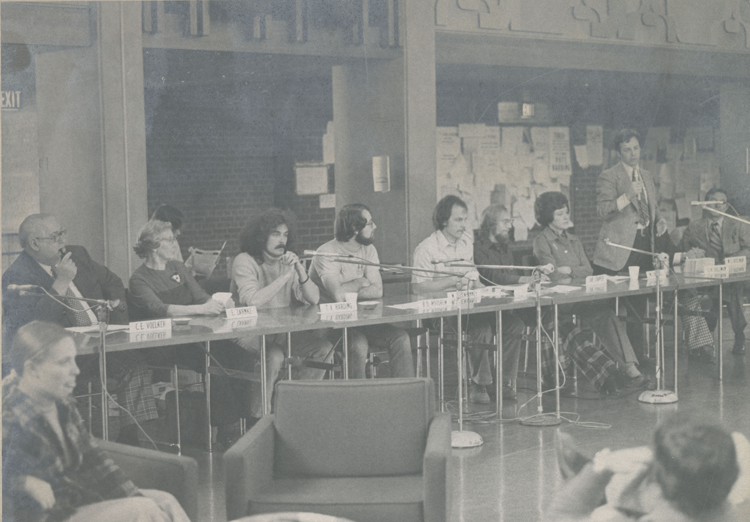
Andrew Telegdi (centre) participates in a Federation of Students all-candidates meeting in the Campus Centre Great hall in 1974.
This article was originally published on the Library's website.
Special Collections & Archives (SCA) just got a little bigger with the addition of the Andrew Telegdi fonds. Andrew Telegdi (BA '80) was a federal MP from 1993 to 2008, a local Waterloo City councillor from 1985 to 1993 and a past Federation of Students (now WUSA) president from 1973-74.

Born in Budapest, Hungary, Telegdi immigrated to Canada with his family in 1957 during the Hungarian revolution. In his early twenties, he was a rock music promoter and ran the Village Bistro in Vancouver as a music venue until it closed in 1969. The 1970s saw Telegdi move east to Ontario to attend the University of Waterloo, graduating with a BA in Psychology in 1980.
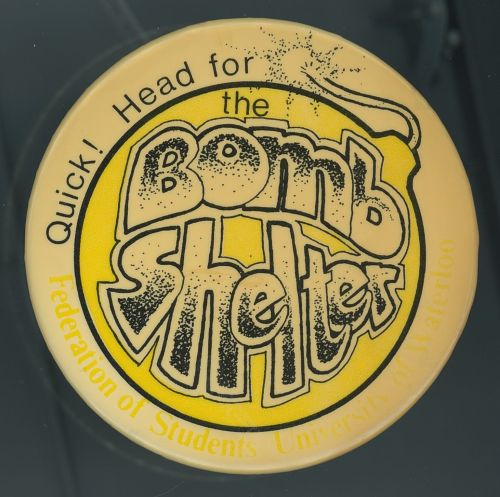
During his time at Waterloo, Telegdi was actively involved in student politics, participating as a student representative on the Senate as well as two terms as president for the Waterloo Undergraduate Student Association (editor's note: it was then known as the Federation of Students).
After graduating Telegdi stayed in the area, working in regional politics and at youth organizations that support those in legal difficulty. He helped launch the first Justice Week in Canada right here in Waterloo in 1979.
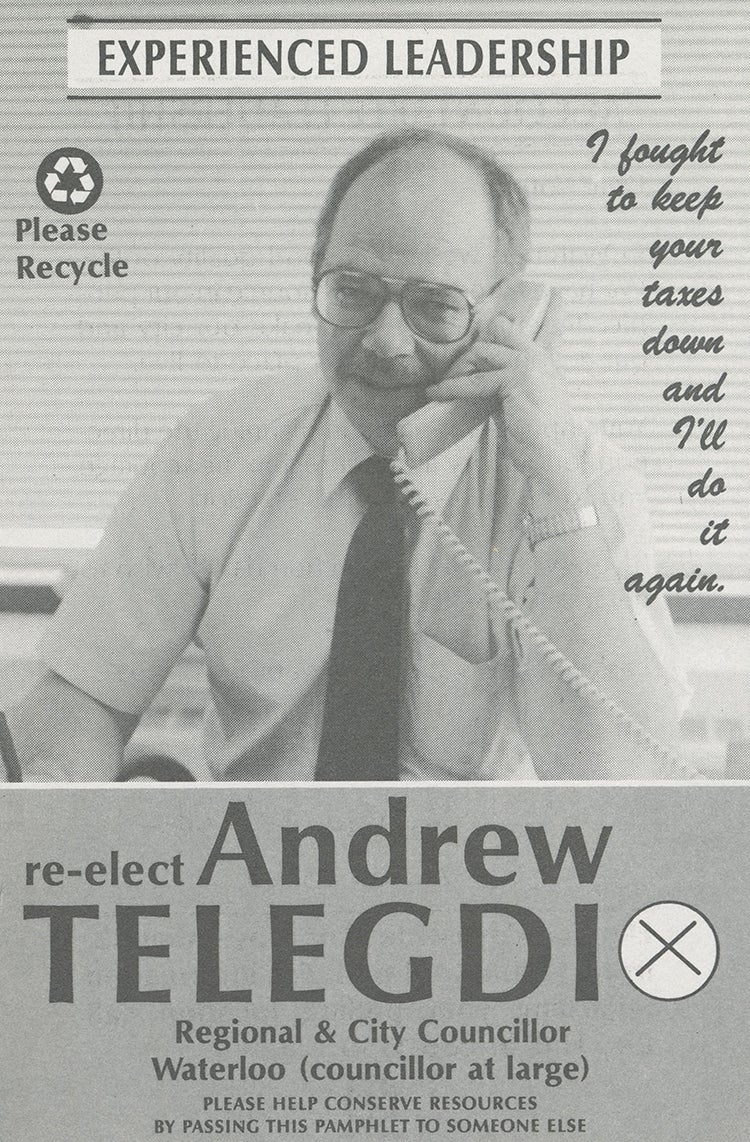
In 1993, he ran in the federal election to become an MP for the Liberal party, holding the seat for the Waterloo region until 2008. During his tenure, he worked on issues related to citizenship and immigration, same-sex marriage, crime and diplomatic relations. He also remained a strong advocate for student voices, often visiting local campuses to speak directly to the issues impacting youth.
Including unique personal memorabilia and political correspondence, the collection was donated by Nancy Telegdi, his wife, in 2017. Since then, Nicole Marcogliese, Special Collections & Archives Archivist, has invested a significant amount of time processing the donation and researching Telegdi's life to confirm details to complete a "finding aid," which makes the collection searchable to researchers.
This collection will be vital to researchers conducting original research into local and national political issues. Looking back at how policies have progressed over the years can provide important context and direction for the future.
The Andrew Telegdi fonds is now available for viewing in person. If you would like to view items from the collection, contact SCA to book an appointment.
Upcoming office closure
Campus Wellness – Counselling Services in Needles Hall will be closed today from 12:00 noon onwards due to a team building event and will re-open on Friday August 26 at 8:30 a.m.
Link of the day
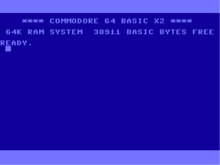
40 years ago: The Commodore 64
When and Where to get support
Students can visit the Student Success Office online for supports including academic development, international student resources, immigration consulting, leadership development, exchange and study abroad, and opportunities to get involved.
Instructors looking for targeted support for developing online components for blended learning courses, transitioning remote to fully online courses, revising current online courses, and more please visit Agile Development | Centre for Extended Learning | University of Waterloo (uwaterloo.ca).
Instructors can visit the Keep Learning website to get support on adapting their teaching and learning plans for an online environment.
Course templates are available within your course in LEARN to help you build and edit your content and assignment pages quickly.
The following workshops, webinars, and events are offered by the KL team (CTE, CEL, ITMS, LIB):
-
Scholarship of Teaching and Learning (SoTL) Methods – self-directed, continuous self-enrollment course in LEARN.
-
Independent Blended Course Design (iBlend) - self-directed, continuous self-enrollment course in LEARN.
-
Copyright Overview for Waterloo Instructors and Staff - self-directed, continuous self-enrollment course in LEARN.
-
Independent Remote Course Design Essentials (iReCoDE) - self-directed, continuous self-enrollment course in LEARN.
-
Supporting Student Mental Health (for Instructors) – self-directed, continuous self-enrollment course in LEARN.
Supports are available for employees returning to campus. Visit IST’s Hybrid Work and Technology guidelines and workplace protocols to assist with the transition.
Students with permanent, temporary and suspected disabilities and disabling conditions (medical conditions, injuries, or trauma from discrimination, violence, or oppression) can register with AccessAbility Services for academic accommodations (classroom accommodations, testing accommodations, milestone accommodations).
Instructors can visit AccessAbility Services' Faculty and Staff web page for information about the Instructor/Faculty role in the accommodation process. Instructors/ Faculty members are legally required to accommodate students with disabilities. AccessAbility Services (AAS) is here to help you understand your obligations, and to offer services and resources to help you facilitate accommodations.
The Writing and Communication Centre has in-person and virtual services to support grad and undergrad students, postdocs and faculty with any writing or communication project. Services include one-to-one appointments, drop-ins at Dana Porter Library, online workshops, writing groups, English conversation practice, and custom in-class workshops.
Co-op students can get help finding a job and find supports to successfully work remotely, develop new skills, access wellness and career information, and contact a co-op or career advisor.
The Centre for Career Action (CCA) has services and programs to support undergrads, grad students, postdocs, alumni, and employees in figuring out what they value, what they’re good at, and how to access meaningful work, co-op, volunteer, or graduate/professional school opportunities. Questions about CCA's services? Live chat, call 519-888-4047, or stop by our front desk in the Tatham Centre 8:30 a.m. to 4:30 p.m., Monday to Friday.
Drop-in to Warrior Virtual Study Halls on Wednesdays from 5:30 p.m. to 7:00 p.m. Come together in this virtual space to set goals and work independently or in groups each week.
Renison's English Language Institute continues to offer virtual events and workshops to help students practice their English language skills.
If you feel overwhelmed or anxious and need to talk to somebody, please contact the University’s Campus Wellness services, either Health Services or Counselling Services. You can also contact the University's Centre for Mental Health Research and Treatment. Good2Talk is a post-secondary student helpline available to all students.
The Library is open with expanded hours for access to book stacks, drop-in individual study space, bookable group study rooms, drop-in access to computers and printers, book pick-up services and IST Help Desk support. Librarian consultations, Special Collections & Archives and the Geospatial Centre are available by appointment. Full details on current services and hours are available on the Library’s COVID-19 Update webpage.
The Faculty Association of the University of Waterloo (FAUW) continues to advocate for its members. Check out the FAUW blog for more information.
The University of Waterloo Staff Association (UWSA) continues to advocate for its members. Check out the UWSA blog for more information.
The Sexual Violence Prevention and Response Office (SVPRO) supports all members of the University of Waterloo campus community who have experienced, or been impacted, by sexual violence. This includes all students, staff, faculty and visitors on the main campus, the satellite campuses, and at the affiliated and federated Waterloo Institutes and Colleges. For support, email: svpro@uwaterloo.ca or visit the SVPRO website.
The Office of Indigenous Relations is a central hub that provides guidance, support, and resources to all Indigenous and non-Indigenous campus community members and oversees the University's Indigenization strategy.
The Waterloo Indigenous Student Centre, based at St. Paul’s University College, provides support and resources for Indigenous students, and educational outreach programs for the broader community, including lectures, and events.
WUSA supports for students:
Peer support - MATES, Glow Centre, RAISE, Women’s Centre - Click on one of the links to book an appointment either in person or online for the term.
Food Support Service food hampers are currently available from the Turnkey Desk 24/7 in the Student Life Centre. Drop-off locations are also open again in SLC, DC, DP, SCH, and all residences.
Co-op Connection all available online.
Centre for Academic Policy Support - CAPS is here to assist Waterloo undergraduates throughout their experience in navigating academic policy in the instances of filing petitions, grievances and appeals. Please contact them at caps@wusa.ca.
WUSA Student Legal Protection Program - Seeking legal counsel can be intimidating, especially if it’s your first time facing a legal issue. The legal assistance helpline provides quick access to legal advice in any area of law, including criminal. Just call 1-833-202-4571.
Empower Me is a confidential mental health and wellness service that connects students with qualified counsellors 24/7. They can be reached at 1-833-628-5589.
GSA-UW supports for graduate students:
The Graduate Student Association (GSA-UW) supports students’ academic and social experience and promotes their well-being.
Advising and Support - The GSA advises graduate students experiencing challenges and can help with navigating university policies & filing a grievance, appeal, or petition.
Mental Health covered by the Health Plan - The GSA Health Plan now has an 80 per cent coverage rate (up to $800/year) for Mental Health Practitioners. Your plan includes coverage for psychologists, registered social workers, psychotherapists, and clinical counselors.
Dental Care - The GSA Dental Plan covers 60 to 70 per cent of your dental costs and by visiting dental professionals who are members of the Studentcare Networks, you can receive an additional 20 to 30 per cent coverage.
Student Legal Protection Program - Your GSA fees give you access to unlimited legal advice, accessible via a toll-free helpline: +1-833-202-4571. This advice covers topics including housing disputes, employment disputes, and disputes with an academic institution.
The Graduate House: Open Monday to Tuesday 11:30 a.m. to 7:00 p.m. and Wednesday to Friday 11:30 a.m. to 9:00 p.m. We’re open to all students, faculty, staff, and community members. The Graduate House is a community space run by the GSA-UW. We’re adding new items to the menu. Graduate students who paid their fees can get discounts and free coffee. Note: The Graduate House is closed from August 20 to September 5, 2022.
When and Where (but mostly when)
Warriors vs. Laurier Blood Donation Battle. Join our “Waterloo Warriors” team on the Blood.ca website or app. #ItsInYouToGive
Warriors Youth Summer Day Camps, July 4 to September 2. Open to boys and girls age 5-18. Baseball, Basketball, Football, Hockey, Multi-Sport and Games & Volleyball. Register today.
Warriors Game Day Tickets and Season Passes, on sale now. Cheer on your Warriors W/M Basketball, Football W/M Hockey and W/M Volleyball teams at home during the 2022-23 season. Purchase today.
Warriors Men’s Basketball vs. Ferris State Bulldogs, Friday, August 26, 6:00 p.m., Carl Totzke Court, PAC. Purchase your tickets today.
Retirement celebration for Ron Koelewijin, Wednesday, August 31, 2:00 p.m. to 4:00 p.m., South Side Marketplace dining hall.
NEW - TBH: To Be Honest premiere performance, Thursday, September 1, 3:00 p.m. to 4:00 p.m., PAC gym.
Labour Day holiday, Monday, September 5, most University operations closed.
Deadline to register for Centre for Extended Learning (CEL) "Getting Ready to Facilitate Online Courses: TA Training – Fall 2022" course, Sunday, September 11.